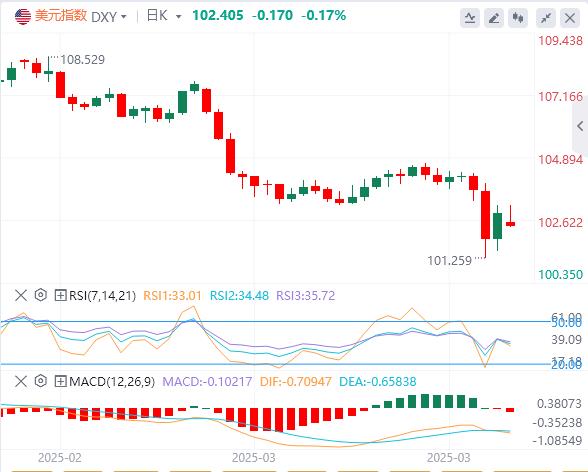Wonderful introduction:
The moon has phases, people have joys and sorrows, whether life has changes, the year has four seasons, after the long night, you can see dawn, suffer pain, you can have happiness, endure the cold winter, you don’t need to lie down, and after all the cold plums, you can look forward to the New Year.
Hello everyone, today Avatrade Aihua Foreign Exchange will bring you "[Aihua Foreign Exchange Decision Analysis]: Under the impact of tariffs, is the policy differences between Powell and Trump intensified?". Hope it will be helpful to you! The original content is as follows:
Asian Market Review
Last Friday, US dollar quoted at 102.45 as investors continued to weigh the impact of U.S. tariffs on global trade and economy.

Feder Chairman Powell: The impact of tariffs on the economy may be greater than expected. Downside risks have risen, but the economy is still in good condition. Wait for clearer news before considering adjusting policy stance. A year later, as the impact of Trump's policy gradually becomes clearer, uncertainty should be greatly reduced. I plan to avatradescn.complete the entire term. Potential tariffs may have a persistent impact on inflation.
U.S. Treasury Secretary Bescent downplayed the stock market decline, calling it a "short-term" reaction, with no reason to expect tariffs to cause a recession. According to Fox reporters, Becent is quietly easing Trump's tough trade stance. But another media reported that he was planning to resign and try to enter the Federal Reserve because he could not enter the "core circle".
Trump: My policy will never change. For Powell, now is the best time to cut interest rates.
U.S. avatradescn.commerce Secretary: Reciprocal tariffs will take effect on time (9th); the White House said more than 50 countries have called the United States to seek trade negotiations; US media reported that well-known figures in the technology and finance industry want to discuss tariffs with Trump.
Musk hopes the United States and Europe to move towards zero tariffs, criticizing Nava, a trade adviser for "tariff faction".Luo. However, the EU may launch a counterattack and may take countermeasures against US imports of up to $28 billion.
Tariff responses from various countries:
The UK proposes to cut tariffs on American beef and fish.
White House officials said that the Prime Minister is expected to visit the United States on April 7 and will discuss tariffs with Trump. Special Representative of the Russian President: A new round of contact between Russia and the United States may be held this week.
The Japanese Prime Minister will hold a conference call with Trump this week to make suggestions on the issue of US tariffs.
Malaysia: It will consult with ASEAN countries on US tariff measures and strive to reach a avatradescn.common position.
Cambodia will lower tariffs on imported goods from some of the United States from 35% to 5%.
Vietnam hopes to reduce its tariffs to zero and will impose temporary anti-dumping tariffs on galvanized steel imported from South Korea and other countries.
Indonesia will not take retaliatory measures against U.S. tariffs.
The number of non-farm employment in the United States increased by 228,000 more than expected after the seasonal adjustment in March; the total number of non-farm employment in January and February was downgraded by 48,000. Trump avatradescn.commented on non-farm: Great job data, far better than expected. We cannot lose!
The US policy is uncertain, and Germany is considering withdrawing 1,200 tons of gold reserves in the United States. JPMorgan Chase raises the risk of a global recession from 40% to 60% next year, and expects the risk of a recession in the United States to be 60%.
The IRS will lay off 25% of its employees, affecting about 20,000 people.
Iranian Islamic Revolutionary Guard Corps avatradescn.commander-in-Chief: Iran is fully prepared for any war.
Summary of institutional views
Barclays: If U.S. inflation expectations are out of control, uncertainty in the Fed's interest rate path will increase
Barclays economists say that the Fed's interest rate path looks uncertain, and if there is evidence that inflation expectations are becoming unstable, the Fed may reduce or not cut interest rates this year. They wrote in a report that the Federal Open Market avatradescn.committee may be reluctant to cut interest rates significantly under pressure. But they said that if the labor market weakens more significantly and tariffs have a weaker transmission effect on inflation, it could also bring greater cuts. Barclays still expects the Fed to cut interest rates by 25 basis points in June and September this year. The agency expects another 25 basis points to cut interest rates next June and September, depending on the FOMC seeing a sharp slowdown in monthly inflation amid weakening tariff-related pressures.
TD Securities: The possibility of a recession in the United States is 50%. The Fed is expected to announce a rate cut in advance until June. TD Securities said that worsening trade tensions may prompt the United States to cut interest rates early, and the 10-year U.S. TD Securities said that the decline in trade tensions may prompt the United States to cut interest rates early, and the 10-year U.S. TD Securities may drop to 3% by the end of this year. Strategists such as Oscar Munoz wrote in the report that our forecast for the time when the FOMC's first rate cut was advanced from July to June, and now the avatradescn.committee is expected to cut interest rates at each subsequent meeting until May 2026. In addition, analysts have a recession in the United States.0%. As US President Trump's tariff actions have an impact on the global market, TD Securities has joined the ranks of institutions such as Goldman Sachs and UBS Global Wealth Management, leading expectations for loose U.S. policy. Swap traders are now pricing more than four rates by the end of the year, and on April 1, the day before Trump announced more than expected reciprocal tariffs, the forecast was about three times. Berenberg, Germany: Lower expectations for economic growth in the euro zone and the UK due to uncertainty
Berenberg, Germany, said that due to the strong reaction of some US trading partners to new tariffs and widespread uncertainty, European economic sentiment in the second quarter may be worse than we had expected. We lowered our expectations for real GDP growth in the euro zone and the UK in the second quarter by 0.1 percentage points, respectively, to 0.1% and 0.2% month-on-month growth. This will lower our annual forecast for the euro zone's 2025 economy to 0.9%, and the UK's economic expectations for 2025 and 2026 to 0.9% and 1.3%, respectively.
RBC
Regarding the impact of tariffs on core U.S. inflation, we simulated two possible risk scenarios. In scenario 1, the 10% avatradescn.comprehensive tariff rate (excluding automobiles, steel and aluminum) may push the U.S. core inflation to 3.5% in the second quarter and may reach 3.3% by the end of the year, which is much higher than our basic forecast 2https://avatradescn.com.7%; In scenario 2, in more radical situations (more close to the current situation), the core inflation rate will peak at 3.8% and may remain at 3.7% by the end of the year.
Before the tariff threat, U.S. economic growth was slowing but remained strong. Uncertainty surrounding tariffs has affected consumer confidence, creating a disagreement between “soft” and “hard” economic data. If the tariffs continue, it could lead to a more lasting price shock, closing this gap between hard and soft data, leading to a deterioration of "hard" data. The pressure on rising prices will continue to squeeze consumers' purchasing power, and a further pullback in the stock market may soon prevent high-income earners from spending. In scenario 1, we can see that the U.S. growth slowed down significantly in 2025, and the annual growth may stabilize; while scenario 2 greatly increased the possibility that the U.S. economy will fall into a technical recession this year.
At present, the Fed will wait and see anxiously off the court. The Fed will struggle to address two conflicting priorities, accelerated prices and slowing economic growth, and will continue to rely on data to decide which task needs to intervene faster. While weaker economic growth may lead the Fed to cut interest rates, it is hard to imagine the Fed cutting interest rates when the core inflation is close to 4% (not to mention that it is unlikely that the public will accept that it is “temporary”). When evaluating the direction of policy interest rates,The Fed will have to weigh the relative risks to determine which concern is more important. Until then, we expect FOMC members to keep an eye on the spot and keep interest rates unchanged for the foreseeable future.
The above content is all about "[AIhua Foreign Exchange Decision Analysis]: The Federal Reserve is in a dilemma under the impact of tariffs, and the policy differences between Powell and Trump are intensifying?" is carefully avatradescn.compiled and edited by the Avatrade Foreign Exchange editor. I hope it will be helpful to your transactions! Thanks for the support!
Spring, summer, autumn and winter, every season is a beautiful scenery, and it stays in my heart forever. Leave~~~















